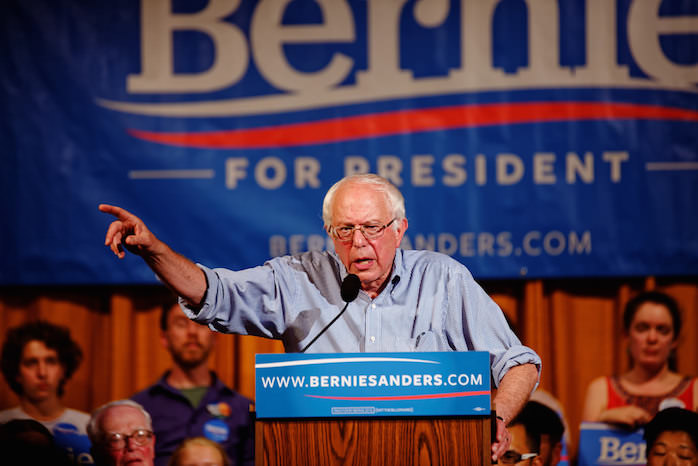Why Bernie Sanders Is Best on Women’s Issues
Sanders understands that women's struggles can't be compartmentalized into issue silos. That's why he has long eschewed counterfeit gestures of "gender diversity" in favor of genuine social equality. Michael Vadon / CC BY 2.0
Michael Vadon / CC BY 2.0
By Heather Gautney This article first appeared in The Huffington Post.
Women’s issues are taking center stage in the lead-up to 2016. As they should: The conservative war on women’s health and reproductive rights has raged on for far too long. And in all measures of social and political inequality, we remain what number-crunchers coolly term “disproportionately affected.”
Many people believe that electing a woman president will help. I’m not so sure. Does breaking glass ceilings constitute a real political strategy — that’s capable of improving women’s lives? And does voting one’s gender really translate to voting one’s interest?
Let’s consider the issues:
On women’s right to choose, Republican state legislators from Florida to Oklahoma have concocted a series of procedural roadblocks to undermine Roe v. Wade–like mandatory waiting periods, ultrasounds, and ideologically-informed, “counseling,” some of which is medically unsound. In 2015 alone, they proposed more than 300 regulations restricting abortion in 45 states, and over the last four years, passed over 200 laws.
Far from protecting women’s health, as advocates claim, anti-choice laws drive up costs and reduce access, especially for women in vulnerable situations. They also drive up risks: Experts warn that drastic reductions in the number of abortion clinics in states like Texas and Alabama are likely to increase the numbers of dangerous, self-induced abortions.
The Right’s war on women has also targeted basic gynecological services that save millions of women’s lives each year, like STD and breast-cancer screening. Fervent efforts by anti-abortion groups to delegitimize and defund Planned Parenthood — alongside political battles over the Affordable Care Act to refuse birth control and emergency contraception — are restricting access to much-needed health services, especially for low-income women.
Bernie Sanders has consistently fought against Republican attacks on reproductive rights. If elected president, he would increase funding for Planned Parenthood. He’s vowed to only nominate Supreme Court justices who uphold Roe v. Wade, and plans to expand women’s health programs, and access to safe and legal abortions. Clinton has also been out front on reproductive rights, but her historic refrain that abortion be “safe, legal, and rare” has only served to stigmatize it and justify conservative efforts to impose legal restrictions.
On the issue of families, Sanders has often pointed out that of 178 countries worldwide, the U.S. is one of three that does not provide new mothers with paid leave. He argues for a Scandinavia-like model, where family leave is part of a robust system of social safety nets. As president, he would provide workers with up 12 weeks of family and medical leave, funded with a small payroll contribution — so that parents can bond with their newborns, and family members care for sick relatives. He would also free millions of women from the struggle to secure childcare by making high-quality services and pre-K available to all Americans, regardless of income.
The Clinton campaign has made family leave a centerpiece of its platform, but the candidate’s level of enthusiasm is not encouraging. Just last year she openly admitted to CNN, “I don’t think, politically, we could get it now.”
In terms of income, most people know that women make only a fraction of what men earn (78 cents per dollar), and the numbers are much worse for blacks and Hispanics. Even women in labor unions, who enjoy the benefits of collective bargaining and workplace regulation, get only 88 cents to a man’s dollar.
Sanders has said that if elected he would sign the Paycheck Fairness Act to end wage discrimination based on gender. He would also increase the minimum wage to $15. Women account for more than half of those who would benefit from just a $10 increase, and they make up 72 percent of all tipped workers, who would also get a substantial raise. Clinton supports a $15 minimum, but only in her home state of New York. She’s offering just $12 for everyone else.
Even with decent wages, however, many Americans have spiraled into financial ruin from excessive medical costs. Women are especially afflicted, as we are less likely than men to be insured, and our healthcare expenses tend to be higher. While Clinton says she’ll go with “what works” in Obamacare, Sanders’ Medicare for All will help reduce out of pocket costs for lower income Americans. Along with expanded retirement benefits, universal healthcare can help eradicate these ruinous trends — which are especially pronounced for elderly women, half of whom would sink into poverty without their Social Security checks.
Finally, there’s the Trans-Pacific Partnership (TPP), which promises to bring jobs, but mostly the kind that exploit poor women in the developing world. American women also stand to lose, as the TPP will enable corporations to outsource low-wage majority-female jobs (and some high-wage ones too). Clinton has been woolly on the TPP, most likely because her husband is among the world’s premier trade liberalizers.
Sanders, on the other hand, has spearheaded the opposition — not just now, but back in the ’90s against Bill Clinton’s NAFTA, which cost American workers over one million jobs and put enormous downward pressure on their wages.
In the end, it looks like the Senator from Vermont is outdoing the woman candidate on pro-woman policy. That shouldn’t come as a surprise. A recent survey by the Ms. Foundation for Women found that “Women do not lead single-issue lives… birth control and abortion is impacted by income level, racial and cultural bias, gender discrimination and immigrant status.”
Bernie has long-understood that women’s struggles can’t be compartmentalized into issue-silos. That’s why he’s long-eschewed counterfeit gestures of “gender diversity” — in favor of genuine social equality.
Your support matters…Independent journalism is under threat and overshadowed by heavily funded mainstream media.
You can help level the playing field. Become a member.
Your tax-deductible contribution keeps us digging beneath the headlines to give you thought-provoking, investigative reporting and analysis that unearths what's really happening- without compromise.
Give today to support our courageous, independent journalists.









You need to be a supporter to comment.
There are currently no responses to this article.
Be the first to respond.